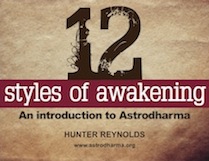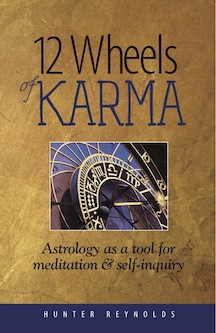 IMAGINE RECEIVING “a three-month astrology reading.” That’s how Gen from Boulder, Colorado described the Styles of Awakening Training. Surely, it would be (as another Styles graduate put it) “a rare opportunity to develop full spectrum vision.”
IMAGINE RECEIVING “a three-month astrology reading.” That’s how Gen from Boulder, Colorado described the Styles of Awakening Training. Surely, it would be (as another Styles graduate put it) “a rare opportunity to develop full spectrum vision.”
An intriguing phrase, no? But what, exactly, does “full spectrum vision” mean? Best to begin with what it’s not: “believed-in mental commentary.”
The purpose of believed-in mental commentary about others is to keep ego undissolved and blind to the truth that observer and observed are one.
~Carl Jung
Here, Jung is asking us to encounter the world as a dreamscape and come alive to the language of archetype and metaphor. Why? So we can quit being yanked around by the veil of personality and master our latent soul-seeing skills. There now. Can you think of a better definition of “full spectrum vision?
Collin Wood concurs,
Coming into this world has meaning only with a view to leading that which is metaphoric back to true being. There are no secret answers spelled out in words in some rare old book. The metaphor is the only way to the answers, if only we have patience and pay attention. Look around: what is life trying to say?
~Collin Wood
Indeed. And given that we are such social creatures, doesn’t it make sense that the bulk of our code-cracking happens interpersonally? Personality traits were not designed to be liked or disliked! They are archetypally embedded way-showers designed to point at the way soul sleeps and wakes to its pristine, unborn nature.
Okay, but which metaphoric system should one study? Well, one thing’s for sure: the symbols had better be kinesthetically verifiable, time-tested, coherent and accessible to the western mind– four areas where modern, meditative astrology absolutely shines.
Joseph Campbell takes the importance of archetypal literacy even further, calling courses like the Styles of Awakening Training an “Apocalypse:”
Apocalypse does not point to a fiery Armageddon. Our divided, schizophrenic worldview, with no mythology adequate to coordinate our conscious and unconscious – that is what is coming to an end.
Think about it. To the extent we lack a revelatory lens that allows us to see the soul-evolving intelligence of life’s otherwise senseless pain and suffering, are we not destined to numb and distract?
Only a cruel God would deposit souls into a mapless world lacking any homeward beckoning signs and symbols. Why are we killing the planet and each other? Thomas Paine knew:
Belief in a cruel God makes a cruel man.
The Meditator’s Objection
Still, many meditators shun astrology. “Why would I cloud my eyes with archetypal stories when naked seeing introduces me to such bare bones beauty and equanimity?” A great question- best answered by Bernardo Kastrup and John Welwood:
Some say the purpose of Advaita is to eliminate all myths through which we interpret sensation. But you can overshoot. You can deny life and stop engaging with it. Something true is generating illusion and it is essential to interpret that illusion and derive meaning from it. To pretend that one can live life without myth is, itself, a myth!
~Bernardo Kastrup
Absolutely. John Welwood continues,
“Advaita-speak” can be very tricky, for it uses absolute truth to disparage relative truth, emptiness to devalue form, and oneness to belittle individuality. By suggesting that only absolute love or being-to-being union is real, these teachers equate the person-to-person element necessary for a transformative love bond with mere ego or illusion.
~John Welwood
Ick! I prefer the god of astrology: a paradox-loving mystic-maker who keeps pushing us to straddle spirit and matter and abide as the vast, Piscean presence enjoying a particular Aries point of view.
Still, let’s not be naive. Mainstream astrology is conceptual quicksand: a collection of superficial “trait bait” that too-often hardens the ego and justifies our interpersonal hopes and fears. Only when personality traits are seen and felt as the Supreme Being in various stages of Self-remembering are the insights of astrology helpful.
That’s the beauty of the Styles of Awakening Training: it pulls self-inquiry out of the clouds and aims it directly at our unique karmic blind spots, patterns and under-valued gifts.
Bottom line: If we learn to perceive archetypes at play in people and do not learn to pause to appreciate the larger Being in which they rise and fall, we’re simply incubating a more virulent strain of separation- a more sophisticated sense of orphanedness.
Am I saying that students of astrology must continually develop deeper levels of humility, self-reckoning and perceptual purity? Absolutely. That’s what makes modern meditative astrology a bona fide spiritual path.
Until then, as Mooji puts it,
When we relate to personality, we are bowing down to conceptual shape.
Buddhists call astrology’s meditative use of the mind to transcend the mind, “skillful means.” Why is this intermediate, archetypal step on the way to Union so important? Because we don’t wake up FROM the ego, we wake up INSIDE it, and..
You don’t see something until you have the right metaphor to let you perceive it.
~Robert Shaw
Amen. And what is the first thing that the serious Astrodharma student sees? This: most human interaction is “Identity Bargaining:”
You tell me I’m right about my unconscious archetypal me-story and I’ll tell you you’re right about yours. Deal?
At this point in one’s mythological mapping, the world can get a bit darker before it reanimates as divine presence. Sure, we’ve always sensed that ego was a feverish identity-grab, but now we have heartbreakingly specific insight into how and why each mind grasps its conditioned me-story for fear of being dissolved by timeless presence. Egoic automation becomes more and more magnified and in-our-face, pushing us to spend more time in meditation. The deeper we get into Astrodharma, the more consciously we flicker: one moment our heart is burdened by the intractableness of God’s sleep; the next moment we’re lost in Rumi-like appreciation of the divine play.
Nobody describes this transition from the “seer of separate somebody’s” to the “embracer of the One Being” better than Thomas Merton:
A life in which we love “god in men” is necessarily an active life. But the contemplative loves “men in God.” When we love “God in men,” we seek to discover him over and over in one individual after another. When we love “men in God,” we do not seek them. We find them without seeking them in Him whom we have found. The first kind of love is active and restless. It belongs more to time and space than the other, which already participates in the changeless peace of eternity.
Or, in Mooji’s words,
There are no dialogues in the universe, only monologues. The human mind cannot cope with this knowledge.
And, finally, here’s Adyashanti,
What you really are is totally in love with seeing itself everywhere.
Here we arrive at the endgame of all archetypal study: The beholding of all human interaction as “awareness in love with itself.”
Looking for a compelling reason to enroll in the next Styles of Awakening Training? This is it!
Ready for more?
–Learn about the Styles of Awakening online training
–Schedule an astrology reading with Hunter
–Subscribe to Styles of Awakening newsletter (monthly)
–Receive these articles by email as they are posted
Like this article? Please share it with friends.


 Get free newsletter & e-book
Get free newsletter & e-book